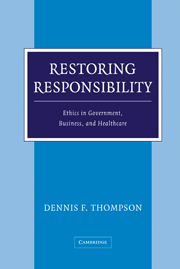Book contents
- Frontmatter
- Contents
- Acknowledgments
- Restoring Responsibility
- Introduction: The Need for Institutional Responsibility
- PART I DEMANDS OF INSTITUTIONAL POLITICS
- PART II VARIETIES OF INSTITUTIONAL FAILURE
- Part III EXTENSIONS OF INSTITUTIONAL RESPONSIBILITY
- 11 Restoring Distrust
- 12 The Institutional Turn in Professional Ethics
- 13 Hospital Ethics
- 14 Conflicts of Interest in Medicine
- 15 The Privatization of Business Ethics
- 16 Democratic Theory and Global Society
- Credits
- Index
14 - Conflicts of Interest in Medicine
Published online by Cambridge University Press: 29 January 2010
- Frontmatter
- Contents
- Acknowledgments
- Restoring Responsibility
- Introduction: The Need for Institutional Responsibility
- PART I DEMANDS OF INSTITUTIONAL POLITICS
- PART II VARIETIES OF INSTITUTIONAL FAILURE
- Part III EXTENSIONS OF INSTITUTIONAL RESPONSIBILITY
- 11 Restoring Distrust
- 12 The Institutional Turn in Professional Ethics
- 13 Hospital Ethics
- 14 Conflicts of Interest in Medicine
- 15 The Privatization of Business Ethics
- 16 Democratic Theory and Global Society
- Credits
- Index
Summary
The problem of conflicts of interest began to receive serious attention in the medical literature in the 1980s. Studies have described a wide range of conflicts involving physicians, medical researchers, and medical institutions. Among the areas of concern that have been identified are self-referral by physicians, physicians' risk sharing in health maintenance organizations (HMOs) and hospitals, gifts from drug companies to physicians, hospital purchasing and bonding practices, industry-sponsored research, and research on patients. Yet the concept of conflict of interest itself has been inadequately analyzed, and consequently its elements, the purposes of regulation, and standards for assessment are still often misunderstood.
elements of conflicts of interest
A conflict of interest is a set of conditions in which professional judgment concerning a primary interest (such as a patient's welfare) tends to be unduly influenced by a secondary interest (such as financial gain). Conflict of interest rules, informal and formal, regulate the disclosure and avoidance of these conditions.
In general terms, the primary interests are the health of patients, the integrity of research, and the education of students. The professional duties of physicians, researchers, and teachers give these interests priority. Although what the duties mean may sometimes be controversial (and the duties themselves may conflict), most people agree that whatever else they may imply, they should be the primary consideration in any professional decision that a physician, researcher, or teacher makes.
The secondary interests are usually not illegitimate in themselves. Indeed, they may even be a necessary and desirable part of professional practice.
- Type
- Chapter
- Information
- Restoring ResponsibilityEthics in Government, Business, and Healthcare, pp. 290 - 299Publisher: Cambridge University PressPrint publication year: 2004
- 2
- Cited by



